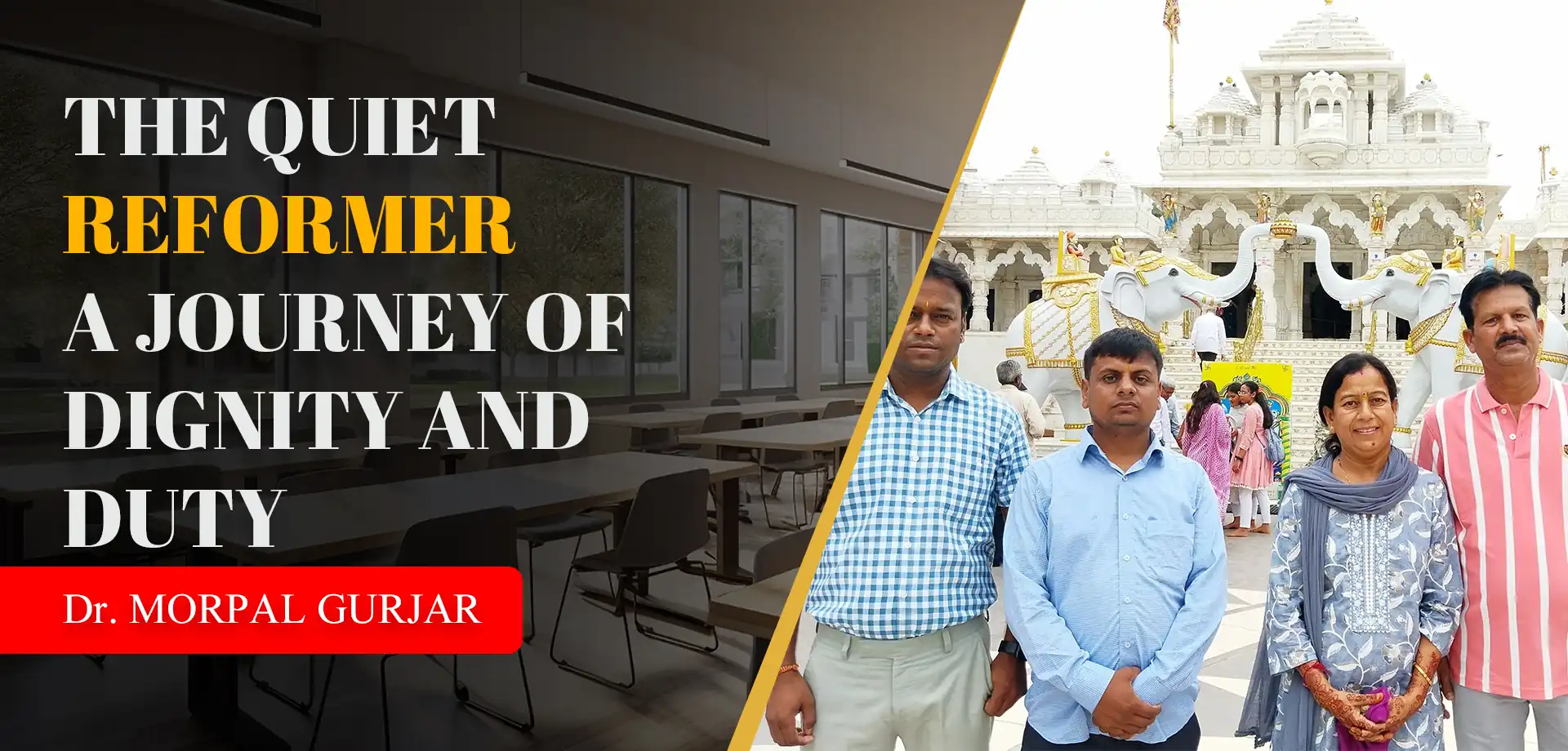
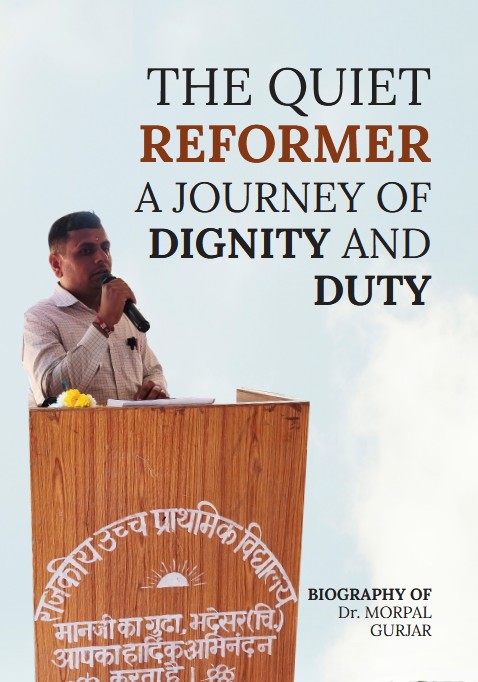
Introduction
The narrative of Dr. Morpal Gurjar is not written in the pages of fame or riches; rather, it is written in the stillness of sorrow and the tenacity of endurance. Over the course of his childhood, he endured a great personal loss and a life of crushing poverty. In spite of this, what arose from these circumstances was not hopelessness but rather drive.
This book provides a portrayal of a guy who was able to convert his restrictions into learning and his hardships into compassion. The life of Dr. Gurjar has been committed to people who do not have a voice, including children who are at risk of being exploited, women who are fighting for dignity, and communities that are yearning for awareness. He has accomplished this via education, service, and an uncompromising moral vision.
The reader is encouraged to ponder not just on his voyage but also on their own journeys through his life. It forces us to trust in the power of empathy as the foundation for making an effect, and it pushes us to see possibility where the world sees none. There is more than simply a biography contained inside these pages; rather, it is a quiet roadmap for lasting change.
Phase 1 : In the Shadows of Struggle: When Survival Becomes the First Lesson in Life
“Out of difficulties grow miracles.”
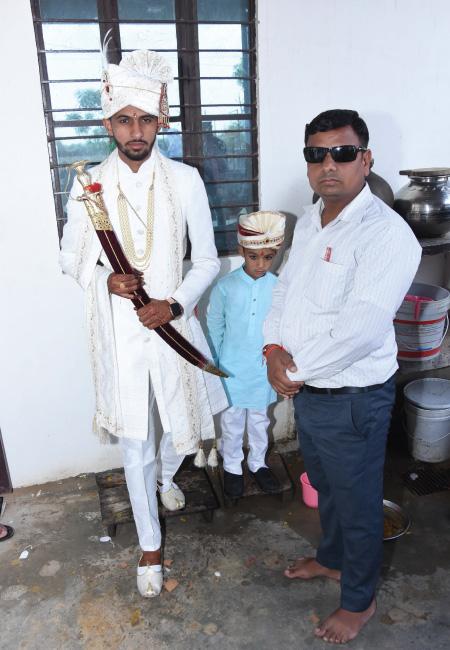
Dr. Morpal Gurjar’s journey started in the midst of severe poverty and the mental burden of a loss that occurred at a young age. His father passed away when he was just three months old, and he was still a baby when the tragedy occurred. He was born into a household that was not very wealthy. As a child who was brought up in a household where there was no father figure, he frequently sought solace at his grandmother’s residence, where he was genuinely loved and emotionally nourished. However, these feelings of warmth were not enough to conceal the severity of reality. His family was constantly in a state of financial instability, and they lived in incredibly humble conditions; at one point, they even lived in a 10×10 room that was devoid of even the most fundamental conveniences.
His recollections of his youth are filled with vivid pictures, such as staring into the same room day after day, wishing for anything different, seeing his mother prepare kheer despite the fact that ice was falling from the roof during the monsoons, and witnessing flour being used as a patch for a roof that was leaking. There were no comforts; the only thing that mattered was surviving each day. His mother remained a shining example of calm tenacity in the face of these hardships, doing everything she could to maintain the home despite the few resources she had.
Although the affection that he received from his grandmother served as a source of emotional support, Dr. Gurjar was unable to escape the daily grind of trying circumstances. His upbringing was not one of encouragement but rather of perseverance, a quality that would later come to characterize a significant portion of his life and the decisions he ended up making.
Phase 2 : Abandoning Childhood for Responsibility: The Early Burden of Becoming the Pillar
“You must be the change you wish to see in the world.”
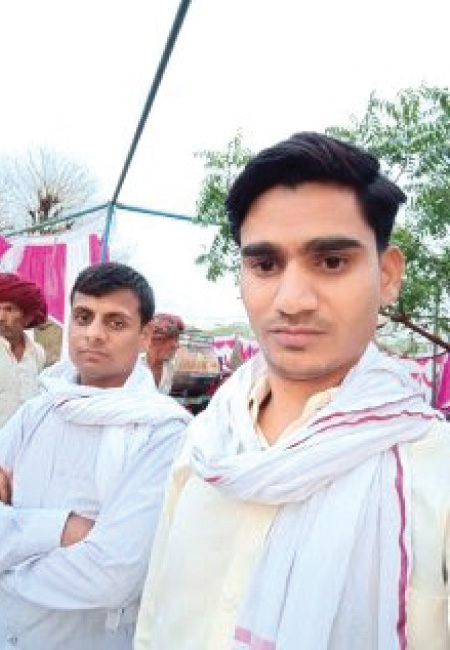
While most youngsters fantasize about playing with toys and games, Dr. Morpal Gurjar’s upbringing was filled with the struggle to survive and the need to make sacrifices. Due to the fact that he was the oldest member of a dysfunctional family, he was forced to give up the carefree spirit of his youth and assume the responsibility of being the primary caregiver and provider. Every year that went by made the burden of duty more difficult to bear. The state of being poor was not a fleeting event; rather, it was a reality that was woven into the fabric of everyday existence.
At the time that he was in the seventh grade, the burden of his family’s requirements had already eclipsed his own aspirations. Not only were thoughts of dropping out of school not hypothetical, but they were also immediate, looming, and scary. There were times when he was forced to pick between eating a meal and doing his schoolwork. Education became an extravagance that he could no longer afford since he did not have any financial cushion, he did not inherit any inheritance, and he did not have a consistent salary. He was prepared to engage in manual labor and was willing to give up his future in order to enable his family to maintain their basic level of existence. But even under the most precarious of circumstances, brightness manifested itself. A caring principal took note of his extended absence and inquired as to the reason for the unexpected disappearance of a student who showed great potential. In response to Dr. Gurjar’s explanation of his financial difficulties, the instructor did not only express compassion; rather, he gave potential answers. The insignificant actions he took to show his support sparked a glimmer of faith. Additionally, there were those who provided tiny acts of kindness, such as the provision of second-hand clothing, encouragement, and mentoring.
Instead of viewing these events as acts of charity, Dr. Gurjar saw them as the beginnings of a sense of moral obligation. They instilled in him the early realization that the world might change for the better if someone was willing to take the initiative to make that change. Indeed, he came to the realization that it could be him.
This particular phase of his life was not simply about fleeing poverty; rather, it was about understanding the transformational power of compassion he had experienced. It was at these times that he began to make a quiet pledge to himself, not only to finish his studies but also to come back, offer encouragement, and one day become the support system for other people that he had so sorely needed in the past.
Phase 3 : Education Against All Odds: Climbing a Mountain Without Shoes
“Education is the most powerful weapon which you can use to change the world.”
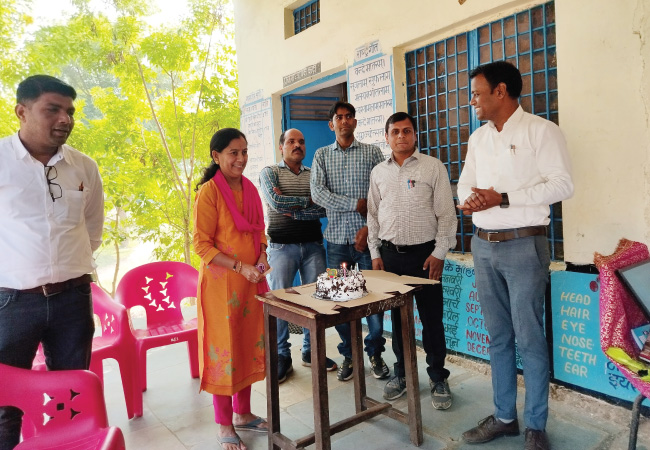
Dr. Morpal Gurjar never considered education to be a given; rather, he considered it to be a battle. In his academic career, he achieved each and every milestone by making sacrifices, improvising, and relying only on his own willpower. Unlike individuals who are born into affluence or who are able to concentrate without interruption, he had to carry his books through a variety of challenges, both emotional and financial. However, in spite of every obstacle, he frantically clutched to learning like it was a lifeline.
With a newfound sense of determination, he went back to school after coming dangerously close to dropping out when he was a teenager. Even though he did not have any school clothes or shoes that were appropriate for school, he went into classes with the intention of reclaiming his right to learn. He frequently resized or patched garments that had been provided to him, and he wore old clothes. His goal was what gave him his dignity, not his outward look.
The government schools had become his safe haven, not because of their physical facilities, but because they provided him with access to textbooks, blackboards, and a place where he could temporarily forget about his starving condition. His efforts paid off, and he became the best student in his class, which was the tenth grade. He devoted himself completely to his studies. Not only was this accomplishment intellectual in nature, but it was also a declaration of defiance against every strange that attempted to prevent him from achieving his goals.
Despite his accomplishment, he was unable to pursue a career in research due to financial constraints. Luxury items such as practical fees, laboratory materials, and books were beyond the financial means of his family. Therefore, he changed his position. He completed his education for eight years, during which time he pursued courses that required less resources, frequently juggling his academic obligations with his part-time responsibilities. In the same period of time, he also started teaching informally, initially for the sake of providing for himself, and subsequently because it turned out to be a calling.
Through constant work, he was able to achieve both his Bachelor of Education and his Master of Education degrees. He frequently enrolled in private classes or attended weekend sessions. While he was helping out at home, he studied under the light of a candle, went over his notes while riding the train, and prepared for his tests. His professors remarked not just on his discipline but also on his sensitivity; he frequently provided free tutoring to children who were struggling academically